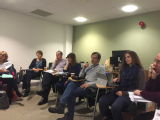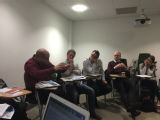Archive
PJC Digest 1
The initial PJC meeting was held in a windowless cavern somewhere near the heart of Milburn House! Despite the surroundings, the atmosphere was positive and engaging discussion emerged meaning the hour and a half passed swiftly. Below you will find a summary of our discussions and links to the papers we looked at, as advertised, the initial meeting deviated slightly from an established journal club format to discuss the overarching PJC aims. These were agreed upon by the members as being:
- The PJC will aim to affect teaching practice across the university through critical engagement with research, following which members can make informed pedagogical decisions.
- The PJC will be a vehicle for sharing best practice through discussion of pedagogy, challenging the status quo in order to become leaders in the field of innovative HE pedagogy.
- The PJC will encourage and support colleagues interested in pedagogic research to develop confidence to engage in research of their own
The format of future meeting will then be as follows;
1. Discussion of suggested papers for 30 minutes looking in detail at the methodology and conclusions of the research
2. 30 minutes where we ask our two fundamental questions
How could the research be translated into improved learning and teaching in our own discipline?
Should the research inform our teaching practice or our departmental learning and teaching philosophy?
3. The last 30 minutes will then be put over to open discussions for PJC members to develop research and to share best pedagogical practice from their disciplines.
The papers we looked at on 15th December were:
How to run an effective journal club: A systematic review
The OU Innovating pedagogy 2016 report
Following a brief look at the methodology of the paper the group turned its attention to the differences in methodological approaches to pedagogic research compared to our experience of research conducted within our own disciplines. It was decided that there was enough experience of pedagogic research within the PJC membership for the group to be able to act as a sounding board for people who wish to begin research of this type.
The aims of the group were discussed in depth, as per the article, and Kate and Graeme were keen to promote the motivation for the PJC was the desire to have an impact on the taught student experience. Supported by all the PJC members present, we discussed our critical engagement with research in order to become knowledgeable friends for colleagues who are investigating pedagogical approaches or making decisions around assessment or structure of courses in order to improve the taught experience for students. It is important to note here that the student reps for teaching and learning were invited to the PJC but couldn’t make it.
There was a desire to be engaged in leading innovative pedagogy as opposed to simply discussing and reporting back to colleagues, the possibility of writing articles for publication which focus on the numerous pedagogic innovations here at Warwick was raised and supported.
When looking at the OU report it was acknowledged that the report itself was not research and the limitations and implications of this were discussed openly. Moving forwards we will engage with research articles in areas that are of interest to the PJC and as such a polling option was discussed as a way to ensure we choose something of interest to all at each meeting. The polling options will appear in the near future via this page.
We looked at a few of the innovative pedagogies suggested by the OU and compared our experience of these approaches at Warwick finding ourselves to be engaged in many of the listed approaches, as well as innovative in a number not listed. From this we discussed what pedagogies we would like to engage with in the future and as a result have identified “group work” as an area of interest. As such the papers for the next journal club will be based on group work, if you have any suggestions for papers please email k.mawson@warwick.ac.uk. Kate will then distribute selected papers a week prior to the next meeting.
All present agreed it was a very productive 90 minutes, despite the furniture jumble that surrounded us, and Kate would like to publically thank the numerous colleagues who emailed with messages of support and thanks following the initial meeting. She hopes that many of you will be able to make the next meeting, dates for future meetings and registration are available here
PJC Digest 2
The second meeting of the PJC took place on 16th February in H3.56, which was a little off the beaten track for most of us, but which at least had the advantage over our first venue of windows and as much natural light as February could muster.
The subject was ‘Group Work’ and the papers reviewed were:
1. David Livingstone & Kenneth Lynch (2000) Group Project Work and Student-centred Active Learning: Two different experiences, Studies in Higher Education, 25:3, 325-345.2. Jane Burdett (2003) Making Groups’ Work: University Students’ Perceptions, International education Journal, 4:3, 177-191
The format as agreed at the inaugural meeting was:
1. Discussion of suggested papers for 30 minutes looking in detail at the methodology and conclusions of the research
2. 30 minutes where we ask our two fundamental questions
How could the research be translated into improved learning and teaching in our own discipline?
Should the research inform our teaching practice or our departmental learning and teaching philosophy?
3. The last 30 minutes will then be put over to open discussions for PJC members to develop research and to share best pedagogical practice from their disciplines.
The papers generated a number of interesting conclusions including:
While often initially sceptical, students generally recognised the benefits of group work for their learning and for the ability to create different responses to problems.Students expressed concern with ‘fairness’ of assessment.Formalising roles had potential to avoid exclusion of some group members from the process (either through their design, or through the agency of others).
There was a general comment on the somewhat anecdotal nature of the papers, which seemed largely reportage to some of the group.
Members shared their experiences of group work and an interesting dichotomy emerged between the practice of some colleagues in sciences, where group work always had an element of summative assessment; and colleagues in humanities, where it did not. This appeared to markedly (and not unexpectedly) affect the attitudes of students attitudes to the task, even when the marks allocated were a very small proportion of the overall module mark. The addition of peer review practices which modify the group mark for individuals based on their colleagues’ assessment of their performance appeared to exacerbate gaming behaviours observed in the assessed group work. Interestingly, these behaviours were seen as ‘expected’ within the ‘science’ faculty paradigm and ‘not understandable’ by the humanities faculty.
It was felt that a key differentiator in outcomes was whether the focus principally on the task allocated (i.e. content led) or on the team-working element (i.e. process-led). It was suggested that team-working skills matrices – used in WBS and secondary education, for example – might be useful in directing thinking to the latter. In this context it was noted that some disciplines had greater expectations that, once employed, graduates would be working in teams. It was further noted that (according to HEA research) often what employers said they wanted from graduates was not what they actually wanted; asking for challenge and free-thinking, for example, when, in reality compliance and conforming to norms was required. One dimension of team work might be vocational transferable skills, and another; socialization (e.g. ‘who am I being in the context of the group work?’).
Reflective self-assessment and peer assessment were seen as important to make sense of the experience. For example, the often mentioned issue of ‘free-riders’ might, in some cases actually reflect exclusion or domination by other members of the group rather than a wilful lack of contribution on the part of the individual.
Student concern with fairness, it was suggested, centred more on effort than outcome; students appeared to be more concerned with equal reward for equal effort than with parity of reward for equivalence of outcomes.
Cross-cultural issues and rights and responsibilities of students involved in group working were briefly raised, but there was no time to discuss in depth.
A potential avenue of scholarly activity arising from the discussion was a deeper exploration of the ways in which group work is used, managed and evaluated in different disciplines. This might, perhaps, be considered as an aspect of discipline ‘Signature Pedagogy’ and the rationales for differing approaches explored in that context. Graeme and Kate would like to hear from colleagues who would be interested in investigating this further.
Finally, any comments on the content of this digest, any experiences or ideas around the subject, or any thoughts on how to explore group-work further would be gratefully received.
Until next time…
PJC Digest 3
In surroundings more conducive to growth than previous meeting places, the PJC had an hour and a half of engaging, well informed and wide ranging discussions about feedback in higher education. Of the papers we looked at, the Nicolls work was recieved warmly by the group,We discussed a range of methodological issues, as well as the value of the quantitiaitve and qualitive evidence provided by the papers and the appropraiteness of data handling technquies employed by all three teams of authors.
Using a more structured approach to timings and with some timely interjections, we managed at last to cover all three of our objectives including a lively discussion around where feedback best practice exisits at Warwick, both Theatre Studies and Film Studies were highly commended by the team.
From this meeting a tangeble outcome was that the group were energised by the benefits of discssing pedagogy with colleagues from other departments and we spent some time considering whether we should work on the production of an article which discusses the effect that these regular sessions, which include both support and challenge, have had on our own professional practice and our pedagogic choices. It is interesting to think again about growth at this point;
"To grow to our full potential, we have to be in the right environment. Growth thrives in favorable conditions. You and I grow the most when we surround ourselves with people and opportunities conducive to our development." (Maxwell 2014) find Maxwell's growth website here
If you would like to contribute to a PJC author team please let Kate know via email and she will look at setting up a writing group in the near future with an aim to produce a finished article for the beginng of the 2017 academic year, it would be a reflective piece and not based on quantitiaive data but may well use case studies to explain through narative, changes that members of the PJC have witnessed in their practice which has stemmed from their engagement with the PJC.


